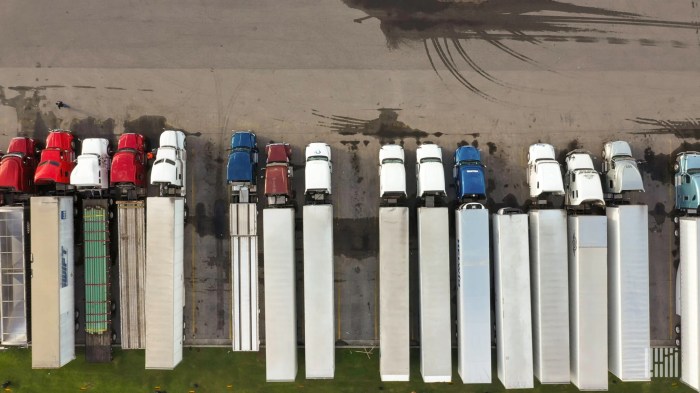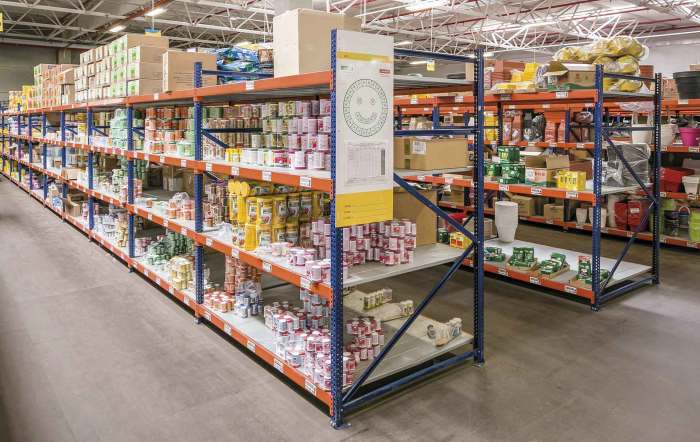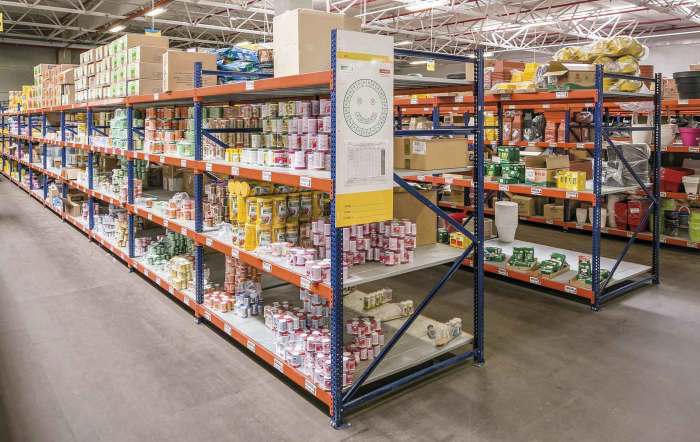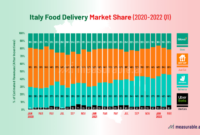Dark store clampdowns new headache for rapid grocery delivery startups – Dark Store Clampdowns: A New Headache for Rapid Grocery Delivery Startups. This phrase encapsulates the growing challenges facing a booming industry. The rapid rise of grocery delivery services, fueled by the convenience of on-demand shopping, has led to a surge in the popularity of “dark stores” – dedicated warehouses optimized for swift order fulfillment.
But this innovation is facing pushback from local authorities, raising questions about the future of this rapidly evolving sector.
These clampdowns stem from a complex web of concerns, ranging from zoning regulations and traffic congestion to competition with traditional brick-and-mortar grocery stores. As these restrictions tighten, rapid delivery startups are grappling with the need to adapt their business models and navigate a landscape where the lines between convenience and regulation are increasingly blurred.
The Rise of Dark Stores and Rapid Grocery Delivery

The rapid growth of online grocery shopping has led to the emergence of a new business model: dark stores. These are warehouse-like facilities optimized for fulfilling online grocery orders, offering a swift and convenient alternative to traditional grocery shopping. They play a crucial role in enabling rapid grocery delivery services, which promise to deliver groceries to customers’ doorsteps within minutes or hours.
Benefits of Dark Stores and Rapid Grocery Delivery
Dark stores and rapid grocery delivery services offer several advantages to both consumers and businesses.
- Convenience:Customers can order groceries online and have them delivered quickly, eliminating the need for in-store shopping and long checkout lines. This is particularly appealing to busy individuals and those with limited mobility.
- Speed:Rapid delivery services aim to deliver groceries within a short timeframe, often within minutes or hours. This is a significant benefit for customers who need groceries urgently or who value speed and efficiency.
- Wide Selection:Dark stores typically stock a wide variety of grocery items, offering customers a broader selection than traditional grocery stores. This can be particularly helpful for customers seeking specialty or niche products.
- Cost Efficiency:By eliminating the need for physical storefronts and minimizing overhead costs, dark stores can offer competitive prices and discounts to customers. This is a significant advantage for budget-conscious shoppers.
- Data Insights:Dark stores and rapid delivery services collect valuable data on customer preferences and purchasing habits. This data can be used to optimize inventory management, improve delivery routes, and personalize customer experiences.
Challenges of Dark Stores and Rapid Grocery Delivery
While offering numerous benefits, the dark store model also presents challenges.
- High Operational Costs:Operating dark stores requires significant investments in infrastructure, technology, and labor. This can make it difficult for startups to achieve profitability, especially in competitive markets.
- Inventory Management:Managing inventory in a dark store environment can be challenging due to the high volume of orders and the need for rapid fulfillment. Maintaining freshness and minimizing waste are crucial factors.
- Delivery Logistics:Ensuring timely and efficient deliveries requires a robust logistics network and a reliable delivery fleet. This can be particularly challenging in urban areas with high traffic congestion.
- Competition:The rapid grocery delivery market is becoming increasingly competitive, with established players like Amazon and Instacart competing with numerous startups. This makes it challenging for new entrants to gain market share and establish a sustainable business model.
- Sustainability Concerns:The reliance on delivery vehicles and packaging materials raises concerns about the environmental impact of dark stores and rapid delivery services. Addressing these concerns is crucial for long-term sustainability.
Comparison with Traditional Grocery Shopping
Traditional grocery shopping offers a different experience compared to the rapid delivery model.
- In-Store Experience:Traditional grocery shopping involves browsing aisles, selecting products, and interacting with staff. This can be a social and enjoyable experience for some customers.
- Product Inspection:Customers can physically inspect products in-store, ensuring freshness and quality before purchasing. This is not possible with online grocery shopping.
- Lower Costs:Traditional grocery stores often offer lower prices compared to rapid delivery services, especially for bulk purchases. This is due to lower overhead costs and economies of scale.
- Limited Selection:Traditional grocery stores may have a limited selection compared to dark stores, especially for specialty or niche products.
- Time Commitment:Traditional grocery shopping requires a significant time commitment, including travel time, shopping time, and checkout time. This can be inconvenient for busy individuals.
The Clampdown on Dark Stores: Dark Store Clampdowns New Headache For Rapid Grocery Delivery Startups
The rapid rise of dark stores, dedicated fulfillment centers for online grocery orders, has attracted significant attention, but also raised concerns in various locations. These concerns have led to a wave of clampdowns on dark stores, prompting a reevaluation of their role in the evolving landscape of grocery delivery.
You also can investigate more thoroughly about onfido launches industry first biometric id verification system motion to enhance your awareness in the field of onfido launches industry first biometric id verification system motion.
Reasons for Clampdowns, Dark store clampdowns new headache for rapid grocery delivery startups
The clampdowns on dark stores are driven by a complex interplay of factors, including regulatory concerns, community opposition, and competition from traditional retailers.
- Regulatory Concerns:Dark stores often operate in existing commercial spaces, sometimes requiring zoning changes or exemptions. This can lead to conflicts with local regulations, particularly in residential areas where residents are concerned about increased traffic, noise, and parking issues.
- Community Opposition:The rapid proliferation of dark stores has sparked community backlash in some areas. Residents are worried about the potential impact on local businesses, traffic congestion, and the character of their neighborhoods.
- Competition from Traditional Retailers:Traditional grocery retailers are increasingly investing in their own online delivery services and are actively lobbying for regulations that might restrict the growth of dark stores. They argue that dark stores enjoy an unfair advantage due to their focus on delivery efficiency.
Regulations and Concerns
The clampdowns on dark stores are often driven by specific regulations and concerns.
- Zoning Regulations:Many cities have strict zoning regulations that limit the types of businesses that can operate in certain areas. Dark stores, with their focus on delivery rather than traditional retail, often fall outside the scope of these regulations, leading to legal challenges.
- Traffic and Parking:Dark stores can generate significant traffic and parking demand, particularly during peak delivery hours. This can strain local infrastructure and lead to complaints from residents.
- Environmental Concerns:The increased delivery trips associated with dark stores raise concerns about environmental impact, including greenhouse gas emissions and traffic congestion.
- Job Security:Some argue that dark stores can lead to job losses in traditional grocery stores, as customers increasingly opt for online delivery.
Impact on the Rapid Grocery Delivery Industry
The clampdowns on dark stores have a significant impact on the rapid grocery delivery industry.
- Slower Growth:Restrictions on dark stores can slow down the growth of the industry, as companies face challenges in finding suitable locations and navigating regulatory hurdles.
- Increased Costs:The need to comply with regulations, such as obtaining zoning variances, can increase costs for dark store operators.
- Innovation Challenges:The clampdowns can stifle innovation in the industry, as companies may be less willing to invest in new technologies or models that might face regulatory hurdles.
- Shift in Business Strategies:Companies may need to adjust their business strategies in response to the clampdowns, exploring alternative models or focusing on areas with less restrictive regulations.
Challenges Faced by Rapid Grocery Delivery Startups

Rapid grocery delivery startups, while promising a convenient and fast solution for consumers, face significant operational and financial challenges. These challenges stem from the inherent complexity of the business model, the intense competition, and the evolving regulatory landscape.
Operational Challenges
The operational efficiency of rapid grocery delivery startups is paramount to their success. Startups need to navigate a complex web of logistical challenges, including:
- Inventory Management:Maintaining a diverse and fresh inventory while minimizing spoilage is crucial. Startups need to accurately forecast demand, manage stock levels, and ensure efficient supply chain operations. This is further complicated by the need to cater to a wide range of dietary preferences and allergies.
- Delivery Network Optimization:Building and managing a reliable delivery network with a large fleet of drivers and optimized delivery routes is essential for ensuring timely and efficient deliveries. Startups face challenges in recruiting and retaining drivers, managing delivery schedules, and optimizing routes to minimize delivery times and costs.
- Order Fulfillment:Rapid delivery requires efficient order fulfillment processes. Startups need to streamline picking, packing, and delivery processes to ensure orders are prepared and delivered within the promised time frame. This includes implementing technology solutions for order management, warehouse automation, and delivery tracking.
- Customer Service:Providing excellent customer service is critical for retaining customers in a highly competitive market. Startups need to handle customer inquiries, complaints, and order issues efficiently and effectively. This includes implementing robust customer service channels and providing responsive support.
Financial Sustainability
The financial sustainability of rapid grocery delivery startups is a major concern. These businesses operate in a highly competitive market with razor-thin margins. Key financial challenges include:
- Profitability:Achieving profitability is a significant challenge for rapid delivery startups. The high costs associated with operations, including inventory, delivery, and technology, often outweigh the revenue generated from delivery fees and order values. This necessitates optimizing operational efficiency and exploring innovative revenue streams.
- Competition:The rapid grocery delivery market is fiercely competitive, with numerous players vying for market share. This intense competition drives down prices and margins, making it difficult for startups to establish a sustainable business model. Startups need to differentiate themselves through unique offerings, superior customer service, or strategic partnerships to gain a competitive edge.
- Funding:Rapid delivery startups require significant capital investment to scale their operations. This includes funding for warehouse infrastructure, technology, and marketing. Securing funding from investors can be challenging, especially in a market with limited proven success stories. Startups need to demonstrate strong growth potential and a clear path to profitability to attract investors.
Long-Term Implications of Dark Store Restrictions
The increasing restrictions on dark stores present a significant challenge for rapid grocery delivery startups. These restrictions aim to address concerns about traffic congestion, neighborhood disruption, and competition with traditional grocery stores. The potential long-term implications include:
- Limited Expansion:Restrictions on dark store locations could hinder the expansion of rapid delivery services, limiting their reach and ability to serve new markets. This could slow down growth and limit the potential for startups to achieve scale.
- Increased Costs:The need to find alternative locations for dark stores, such as smaller warehouses or existing retail spaces, could increase operational costs. This could lead to higher delivery fees for consumers or reduced profitability for startups.
- Innovation and Adaptability:Restrictions on dark stores could incentivize innovation and adaptability among rapid delivery startups. This could lead to the development of new delivery models, such as micro-fulfillment centers or partnerships with existing retail stores, to overcome the limitations of traditional dark stores.
Alternative Models and Future Directions
The clampdown on dark stores has forced rapid grocery delivery startups to rethink their strategies and explore alternative models that can ensure long-term sustainability. While dark stores have been a dominant force in the industry, their future is uncertain, leading companies to consider innovative solutions that minimize reliance on dedicated warehouse space.
Partnerships with Existing Grocery Retailers
One promising avenue for rapid delivery startups is to forge strategic partnerships with established grocery retailers. This approach offers several advantages:
- Access to Existing Infrastructure:Retailers already possess extensive distribution networks and established relationships with suppliers, providing a cost-effective and efficient foundation for rapid delivery operations.
- Enhanced Product Selection:Partnering with retailers allows startups to offer a wider range of products, catering to diverse customer preferences and expanding their market reach.
- Brand Recognition and Customer Trust:Collaborating with reputable retailers leverages their established brand recognition and customer trust, building confidence in the delivery service.
“Partnering with established retailers can provide startups with access to a broader customer base, a wider selection of products, and a more robust supply chain, all of which can help them compete in the crowded rapid delivery market.”
[Source
Research Paper on Rapid Delivery]
Innovative Delivery Technologies
The rapid delivery sector is witnessing the emergence of innovative technologies that can streamline operations and reduce reliance on traditional dark stores:
- Micro-fulfillment Centers:These compact, automated warehouses can be strategically located within urban areas, enabling faster delivery times and reduced reliance on large-scale dark stores.
- Robotic Delivery:Autonomous vehicles and delivery robots are being deployed to automate the final mile, reducing delivery costs and enhancing efficiency.
- Drone Delivery:Drones offer a unique solution for rapid delivery, especially in densely populated areas where traditional vehicles face challenges.
“The adoption of innovative technologies like micro-fulfillment centers, robotic delivery, and drone delivery can help rapid delivery startups overcome the challenges posed by dark store regulations and enhance their overall efficiency.”
[Source
Industry Report on Rapid Delivery]





